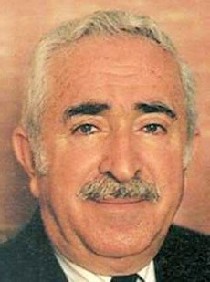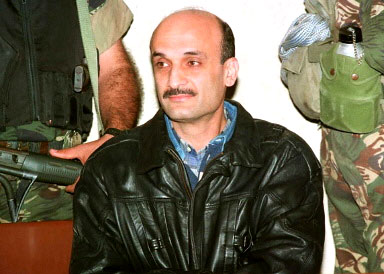25 Years on... Rashid Karami’s: "Murderer" Free!

Hussein Assi
Lebanese Forces chief Samir Geagea was convicted of ordering the assassination. Yet, the latter was released in 2005, not because he is "innocent", but because the Lebanese Parliament decided to "cover" him...
Who's Rashid Karami?
In its statement on the anniversary of Karami's assassination, Hizbullah recalled "the solid national positions of martyr Karami."
Between 1955 and 1987, Karami held office eight times as a Prime Minister. He also served as Minister of Foreign Affairs several times. He was popularly known as a man for all crises because of a penchant of Lebanon's presidents to turn to him in times of major national strife or political upheaval.
Karami was a part of the Islamic Leftist faction in Lebanese politics. During the 1950s, he was a political follower of the Pan-Arabism of Egyptian late president Gamal Abdel Nasser. In 1986, he rejected the National Agreement to solve the Lebanese Crisis, which had been drafted with minimal Sunni Muslim participation. This opposition created a tense relationship with then President Amin Gemayel and pushed him to resign on May 4, 1987, but Gemayel, seeing no viable alternative, refused to accept his resignation.
Geagea Convicted, then Released!
The ruling was declared by the Judicial Council, Lebanon's highest court, ending an eight-month public trial. Yet, Geagea was released in the year 2005 after the assassination of Prime Minister Rafiq Hariri, thanks to an "amnesty" adopted by the Lebanese parliament. Legal experts argue that Geagea is still, in the eyes of the justice as well as the society, Karami's killer. They highlight the fact that he was not release after proving he was "innocent." Rather, he was released after being politically "pardoned."
We Did Not Forget... We Will Not Forgive
"Do you believe that there is a Parliament that pardons a criminal tried by the highest judicial body?" Karami wondered, and stressed that "with this amnesty, the parliament paved the way for crimes and killed Rashid Karami again."
The former PM warned that "the destruction of Lebanon started at the moment the ill-fated amnesty was given to the killer, Geagea, who is acting as if he is the coming Lebanese President."
In parallel, Hizbullah confirmed "the need to enforce justice by prosecuting those who assassinated PM Karami, so that injustice would not prevail as a result of pressure, intervention, default, or politicization."
Between Rashid Karami and Rafiq Hariri...
However, the first one's announced "killer" was "pardoned" to be a political "leader" who does not hesitate to portray himself as "premiership defender" and the one who wants truth in the assassination of a premier, the second one.
Twenty-five years ago, Lebanon's Prime Minister Rashid Karami was assassinated...
The famous politician, believed to be a model of patriotism and a statesman who showed commitment to institutions as well as principles and values, was targeted by a bomb attack on June 1,1987.
Rashid Karami was one of the most important political figures in Lebanon for more than 30 years, and he served as premier for eight times.

Hizbullah hailed the late PM "who...was known for his wisdom, forbearance, courage, and firmness in maintaining the unity of the homeland and the people, also known for fighting conspiracies that aimed at dividing Lebanon and federalizing it into sectarian cantons and trenches."
"These positions represent the highest degree of self-sacrifice for the sake of dignity of the land and the people," the statement read.
Karami's political carrier started in 1951, when he was elected to the National Assembly to fill a vacancy caused by the death of his father. In the same year he became Minister of Justice in the government of Prime Minister Hussein al Oweini.
Less than one month later, Karami was assassinated when a bomb exploded aboard the helicopter in which he was traveling. He was the only one killed in the blast, whereas at least three of a dozen other aides and crew members aboard the helicopter were reported wounded. He was succeeded by Salim al-Hoss.
In 1999, Samir Geagea and ten other members of his party, the Lebanese Forces, were convicted of Karami's murder and given death penalties that were pardoned to lifetime prison terms for their direct planning and participation in Karami's killing.

That's it. The Lebanese judiciary announced the verdict. Geagea was sentenced to death for masterminding the 1987 killing of then-Premier Rashid Karami. However, the sentence was immediately commuted to life in prison. It was the second time he had been sentenced to death for murder, and the previous sentence was also commuted.
"We did not forget, we will not forgive"... This is the slogan raised by late PM Rashid Karami's family, and mainly by his brother, Omar Karami, who succeeded him in the political life. Through this slogan, the family sought to tell the whole world that Rashid Karami's "message" was still alive, and that his values would remain forever.

At the same time, the family wanted to say that forgiving those who killed the late PM was not even an option for them. They believe that those who killed the former premier must be held accountable.
The family has in many occasions declared its refusal to the "amnesty" which turned the killer not only a free man, but also a so-called "supporter" of the state.
On the 25th annual anniversary of the assassination of his brother, former PM Omar Karami lamented "Rashid, the exceptional statesman who was respected by both friends and foes."
"Rashid Karami was among the statesmen who laid down the foundations of the government's institutions," he added.
During a news conference, he further urged the Lebanese Parliament to reconsider the amnesty law that paved the way toward the release of his brother's killer, Geagea.
For his part, Minister Faissal Karami, has recently reiterated the family's belief that Geagea was involved in the crime. "No matter what, Samir Geagea will remain the killer of Lebanon's Prime Minister, and he will remain in our eyes and the eyes of the society and justice a criminal," Karami highlighted.
Rashid Karami and Rafiq Hariri were former premiers in Lebanon. Both were assassinated and turned to be political "symbols" in the country.
"Those who killed Rashid Karami and Rafiq Hariri wanted to assassinate Lebanon," Karami's family once said, a plot that seems to be true if the logic of "pardon" continues...
Source: moqawama.org
Comments




